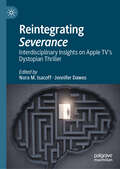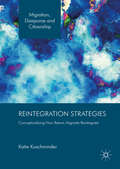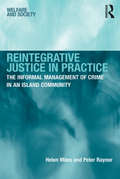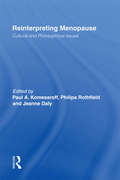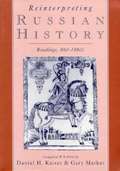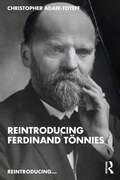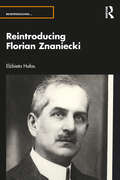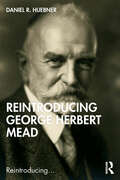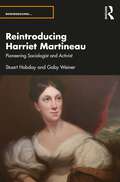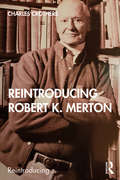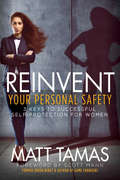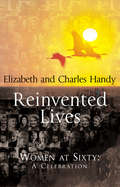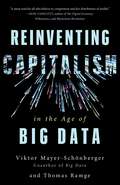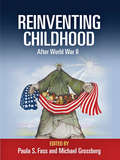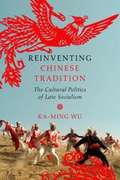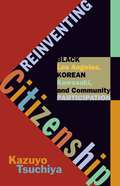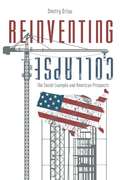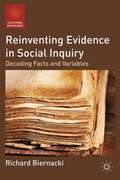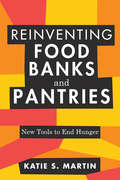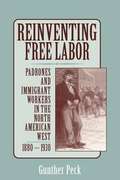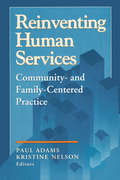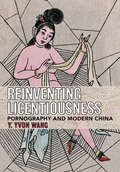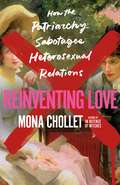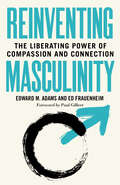- Table View
- List View
Reintegrating Severance: Interdisciplinary Insights on Apple TV’s Dystopian Thriller
by Jennifer Dawes Nora M. IsacoffThis edited collection is an interdisciplinary examination of Apple TV's Severance, in which employees of a biotech firm consent to having their brains severed so that their work selves and non-work selves do not retain each other’s memories. What transpires is a reckoning with the very nature of the self, consciousness, and memory, through a series steeped in explorations of capitalism, social welfare, and bioethics. Chapters in this book examine the popularity and critical acclaim surrounding the show; its retrofuturistic asethetic; its commentary on popular culture and identity; and its engagement with nostalgia, among other topics.
Reintegration Strategies
by Katie KuschminderThis book critically examines and theorizes the process of how return migrants reintegrate into their countries of origin. The result is a new methodology for understanding the experiences of return migrants, or their 'reintegration strategies'. This approach demonstrates that reintegration strategies differ by type of return migrant, leading to variations in how far they are able to contribute to the development of their nation states. The author uses female return migration to Ethiopia as a case study, focusing on the impact of gender on reintegration strategies to analyse the connection between return migration and social change. This book will appeal to scholars of migration and refugee studies, as well as a wider audience of sociologists, anthropologists, demographers and policy makers.
Reintegrative Justice in Practice: The Informal Management of Crime in an Island Community (Welfare And Society Ser.)
by Peter Raynor Helen MilesRecent years have seen the development of a growing international literature on restorative justice, community justice and reintegrative alternatives to formal criminal justice processes. This literature is stronger on theory and advocacy than on detailed evaluative studies. It often relies for its practical examples on the presumed historical practices of the indigenous peoples of colonised territories, or on attempts to revive or promote modified versions of these in a modern context, which has led to debates about how far modern communities can provide a viable setting for such initiatives. This book provides a unique study of the practice of traditional reintegrative community justice in a European society: the Parish Hall Enquiry (PHE) in the Channel Island of Jersey. This is an ancient institution, based on an informal hearing and discussion of a reported offence with the alleged offender and other interested parties, carried out by centeniers (honorary police officers elected to one of Jersey's twelve parishes). It is still in regular use as an integral part of a modern criminal justice system, and it usually aims to resolve offences without recourse to formal prosecution in court. Helen Miles and Peter Raynor's research, arising from direct observation, contributes to the literature on 'what works' in resolving conflicts and influencing offenders, and their detailed case studies of how problems are addressed gives a 'hands on' flavour of the process. The authors also document the aspects of community life in Jersey that facilitate or hinder the continuation of the PHEs, drawing out the implications of these findings for wider debates about the necessary and sufficient social conditions for reintegrative justice to succeed.
Reinterpreting Menopause: Cultural and Philosophical Issues
by Paul A. Komesaroff Philipa Rothfield Jeanne DalyReinterpreting Menopause brings together a number of reflections from a broad range of areas including feminism, cultural studies, clinical medicine, sociology, philosophy and political science and includes the voices and experiences of menopausal women themselves. In an innovative series of essays, current thinking about medicine, society and the body is critically examined. Particular attention is given to the medical representations of menopause, biology and aging, the history of medical approaches to women and the tensions between bio-medical models and other explanations of menopause. Contributors include: E. Ann Kaplan, Emily Martin, Mia Campioni, Fiona Mackie, Roe Sybylla, Wendy Rogers, Kwok Lei Leng, Margaret Morganroth Gullette and Robyn Gardner.
Reinterpreting Russian History: Readings, 860-1860's
by Gary Marker Daniel H. KaiserThis book aims to reflect the latest scholarship on Russian history from its beginnings to the 1860s. Grouped around four chronological units, it features both primary and secondary sources which treat recurring themes of state structure, economy, society, and culture and everyday life, with special attention to gender and cultural history.
Reintroducing Ferdinand Tönnies (Reintroducing...)
by Christopher Adair-ToteffExploring, clarifying, and moving beyond the distinction between ‘community’ and ‘society’ for which he is best known, this book rediscovers the work of Ferdinand Tönnies, providing fresh insights into his thought, which are often overlooked for want of a grasp of his background in philosophy. With attention to the fact that Tönnies always wrote from a sociological perspective, it considers the importance of the breadth of his writing on a range of subjects, including politics, philosophy, economics, and ethics, these being the foundations of social policy—a field with which Tönnies was concerned as a scholar who sought not only to understand the world but also to change it for the better. The first book to provide an accessible overview of Tönnies' work that places his thought in context, explores his key concepts, and demonstrates his continuing relevance in sociology—a discipline he helped to establish—Reintroducing Ferdinand Tönnies will appeal to scholars and students with interests in social theory, the history of sociology, and the sociology of Ferdinand Tönnies.
Reintroducing Florian Znaniecki (Reintroducing...)
by Elżbieta HałasThis book reintroduces the work of Florian Znaniecki (1882–1958) as an innovative constructor of modern sociology who viewed the processes of modernity through the prism of culture and rediscovers his relational thought on the emergence and transformation of cultural and social systems.Exploring the contribution of Znaniecki’s philosophy of culturalism to the cultural approach in sociology, it shows the importance of Znaniecki’s work for the foundation of sociology as one of the cultural sciences. Through an examination of his work on the world society from a cultural perspective, the author reveals Znaniecki to have been a pioneer of global sociology and shows that sociology has much to gain from a fuller appreciation of his legacy in its understanding of processes of social and cultural change.Aimed at students and researchers of sociology, Reintroducing Florian Znaniecki will appeal to those with interests in the dynamics of culture, the cultural sciences, theoretical sociology, and sociological methods. It presents stimulating analytical concepts and offers inspiration for research in many areas, including knowledge, science, education, creative leadership, the emergence of modern nations and world society.
Reintroducing George Herbert Mead (Reintroducing...)
by Daniel R. HuebnerGeorge Herbert Mead has long been known for his social theory of meaning and the ‘self’ - an approach which becomes all the more relevant in light of the ways we develop and represent ourselves online. But recent scholarship has shown that Mead’s pragmatic philosophy can help us understand a much wider range of contemporary issues including how humans and natural environments mutually influence one another, how deliberative democracy can and should work, how thinking is dependent upon the body and on others, and how social changes in the present affect our understandings of the past. Historical scholarship has also changed what we know of Mead’s life, including new emphasis on his social reform efforts, his engagement with colonization and war, and critical reinterpretation of the works published after his death. This book provides an approachable introduction to Mead’s contemporary relevance in the social sciences, showing how a pragmatic view of social action serves as the core of Mead’s theory, offering striking insights into human agency, symbolism, politics, social change, temporality, and materiality. As such, it will appeal to scholars of sociology and the social sciences more broadly, with interests in social theory and the enduring importance of the sociological classics.
Reintroducing Harriet Martineau: Pioneering Sociologist and Activist (Reintroducing...)
by Gaby Weiner Stuart HobdayThis book explores the innovative, sociological approach adopted by Harriet Martineau in her efforts to develop a ‘scientific’ approach to understanding social and societal change. With attention to her focus on the key social structures and societal issues of her day – the economy, education, the condition of women and the evils of slavery – the authors highlight her creation and application of what we now recognise as sociological methodology, fieldwork and analysis. Through an examination in each chapter of the writings that best illustrate Martineau’s sociological perspective, Reintroducing Harriet Martineau discusses her enduring contribution to sociology. As such, it will appeal to scholars and students of sociology with interests in the history of the discipline and questions of methodology.
Reintroducing Robert K. Merton (Reintroducing...)
by Charles CrothersThis book reintroduces the work of Robert K. Merton as a bridge between classical sociology and modern sociology. Founded in the sociological classics but developing a modern approach to the advancement of theory and research methodology, Merton’s thought helped to construct modern sociology in its coverage of many of the social institutional areas of contemporary society. Recovering and analysing the system of ‘structural analysis’ which Merton progressively developed – a system largely overlooked due to the tendency among commentators to stereotype him as a ‘functionalist’ – the author considers the applications of this approach to various substantive fields, particularly science and criminal justice, and examines the effect of Merton’s later ‘sociological semantics’ on his overall schema. A clear and accessible presentation of the array of concepts introduced by Merton to sociology, Reintroducing Robert K. Merton will appeal to scholars and students with interests in sociological theory, social research, the history of sociology and the various substantive areas covered in the work of Merton – deviance, science, and communications.
Reinvent Your Personal Safety: 3 Keys to Successful Self-Protection for Women
by Matt TamasIn Reinvent Your Personal Safety, Matt Tamas takes women through a proactive approach to personal safety, one that isn’t about honing technical moves or perfecting technique, but more about showing them how to work with their own body and mind, considering realistic scenarios, and training them to take appropriate action. Matt’s job, as a personal safety coach, is to not only give women the tools to fight back during an assault, but also to help them prevent themselves from being assaulted in the first place. The right action to take is often in advance of a likely violent encounter in order to avoid it altogether. The best way to protect one’s self is avoiding the situation in which she is forced to defend herself. Reinvent Your Personal Safety talks about the different ways this is possible, as well as about the best way to handle one’s self when violent confrontation simply cannot be avoided. This is for the high-school girl, for the grandmother, for the young professional, for the working mother – anyone who is willing to overcome their limiting beliefs about what they’re capable of and key into what self-protection is really about. In reality, knowledge of the appropriate action to take in any given situation is worth scores more than athleticism.
Reinvented Lives: Women at Sixty: A Celebration
by Charles Handy Elizabeth HandyTwenty-eight women, ranging from Anita Roddick and Prue Leith to less well-known names, write their own personal stories which are accompanied by Elizabeth Handy's black and white photographs and an introductory essay by Charles Handy. This generation of women is entering the sixties more healthy, more educated and more energetic than most of their mothers. The subjects in this book provide the models for what has become, for the first time, a new age for many women. Released from most of the cares and responsibilities that accompany midlife for women, they are free to reinvent themselves, to give more time to their career or calling, or to luxuriate in the serenity and friendships that few had time for in the past. Some enter new relationships, some start new careers or go back to study, some find that their work is only now reaching its peak. Many have survived traumas and tragedies, but 'the past is just the prologue' as one of them explains.
Reinventing Brantford: A University Comes Downtown
by Leo GroarkeShort-listed for the 2012 Speaker’s Award One hundred years ago, the City of Brantford advertised itself as the most important manufacturing centre in Canada. During the century that followed, its industrial economy boomed, faltered, and finally collapsed. By the end of the twentieth century, Brantford was known for unemployment, hard luck, and the infamy of having "the worst downtown in Canada." For twenty years the downtown was in steep decline. Significant attempts at urban revival had failed until Wilfrid Laurier University decided to locate a campus in the heart of Brantford’s crumbling city centre. Leo Groarke revisists the grandeur of the city’s past, explores the economic downfall, and tells the story of the arrival of the university, its early struggles, its commitment to historic restoration, and its ultimate success as a catalyst for urban renewal. The compelling story he recounts will engage anyone interested in the plight of the North-American city core and the role that universities and colleges can play in re-establishing downtowns as vibrant centres of historical and contemporary importance.
Reinventing Capitalism in the Age of Big Data
by Viktor Mayer-Schönberger Thomas RamgeFrom the New York Times bestselling author of Big Data, a prediction for how data will revolutionize the market economy and make cash, banks, and big companies obsoleteIn modern history, the story of capitalism has been a story of firms and financiers. That's all going to change thanks to the Big Data revolution. As Viktor Mayer-Schönberger, bestselling author of Big Data, and Thomas Ramge, who writes for The Economist, show, data is replacing money as the driver of market behavior. Big finance and big companies will be replaced by small groups and individual actors who make markets instead of making things: think Uber instead of Ford, or Airbnb instead of Hyatt.This is the dawn of the era of data capitalism. Will it be an age of prosperity or of calamity? This book provides the indispensable roadmap for securing a better future.
Reinventing Childhood After World War II
by Paula S. Fass Michael GrossbergIn the Western world, the modern view of childhood as a space protected from broader adult society first became a dominant social vision during the nineteenth century. Many of the West's sharpest portrayals of children in literature and the arts emerged at that time in both Europe and the United States and continue to organize our perceptions and sensibilities to this day. But that childhood is now being recreated.Many social and political developments since the end of the World War II have fundamentally altered the lives children lead and are now beginning to transform conceptions of childhood. Reinventing Childhood After World War II brings together seven prominent historians of modern childhood to identify precisely what has changed in children's lives and why. Topics range from youth culture to children's rights; from changing definitions of age to nontraditional families; from parenting styles to how American experiences compare with those of the rest of the Western world. Taken together, the essays argue that children's experiences have changed in such dramatic and important ways since 1945 that parents, other adults, and girls and boys themselves have had to reinvent almost every aspect of childhood.Reinventing Childhood After World War II presents a striking interpretation of the nature and status of childhood that will be essential to students and scholars of childhood, as well as policy makers, educators, parents, and all those concerned with the lives of children in the world today.
Reinventing Chinese Tradition: The Cultural Politics of Late Socialism
by Ka-Ming WuThe final destination of the Long March and center of the Chinese Communist Party's red bases, Yan'an acquired mythical status during the Maoist era. Though the city's significance as an emblem of revolutionary heroism has faded, today's Chinese still glorify Yan'an as a sanctuary for ancient cultural traditions. Ka-ming Wu's ethnographic account of contemporary Yan'an documents how people have reworked the revival of three rural practices--paper-cutting, folk storytelling, and spirit cults--within (and beyond) the socialist legacy. Moving beyond dominant views of Yan'an folk culture as a tool of revolution or object of market reform, Wu reveals how cultural traditions become battlegrounds where conflicts among the state, market forces, and intellectuals in search of an authentic China play out. At the same time, she shows these emerging new dynamics in the light of the ways rural residents make sense of rapid social change. Alive with details, Reinventing Chinese Tradition is an in-depth, eye-opening study of an evolving culture and society within contemporary China.
Reinventing Citizenship: Black Los Angeles, Korean Kawasaki, and Community Participation (Critical American Studies)
by Kazuyo TsuchiyaIn the 1960s and 1970s, the United States and Japan went through massive welfare expansions that sparked debates about citizenship. At the heart of these disputes stood African Americans and Koreans. Reinventing Citizenship offers a comparative study of African American welfare activism in Los Angeles and Koreans&’ campaigns for welfare rights in Kawasaki. In working-class and poor neighborhoods in both locations, African Americans and Koreans sought not only to be recognized as citizens but also to become legitimate constituting members of communities.Local activists in Los Angeles and Kawasaki ardently challenged the welfare institutions. By creating opposition movements and voicing alternative visions of citizenship, African American leaders, Tsuchiya argues, turned Lyndon B. Johnson&’s War on Poverty into a battle for equality. Koreans countered the city&’s and the nation&’s exclusionary policies and asserted their welfare rights. Tsuchiya&’s work exemplifies transnational antiracist networking, showing how black religious leaders traveled to Japan to meet Christian Korean activists and to provide counsel for their own struggles.Reinventing Citizenship reveals how race and citizenship transform as they cross countries and continents. By documenting the interconnected histories of African Americans and Koreans in Japan, Tsuchiya enables us to rethink present ideas of community and belonging.
Reinventing Collapse
by Dmitry OrlovThis new edition of Reinventing Collapse is an update on the growing similarities and differences between the collapse of the Soviet Union and the current unraveling of the United States. With sharp wit and dry humor, Dmitry Orlov shares his personal experiences in post-industrial living and argues that US collapse is survivable given the right attitude and preparation.
Reinventing Evidence In Social Inquiry
by Richard BiernackiRevisiting the dominant scientific method, 'coding,' with which investigators from sociology to literary criticism have sampled texts and catalogued their cultural messages, the author demonstrates that the celebrated hard outputs rest on misleading samples and on unfeasible classifying of the texts' meanings.
Reinventing Food Banks and Pantries: New Tools to End Hunger
by Katie S. MartinIn the US, there is a wide-ranging network of at least 370 food banks, and more than 60,000 hunger-relief organizations such as food pantries and meal programs. These groups provide billions of meals a year to people in need. And yet hunger still affects one in nine Americans. What are we doing wrong?In Reinventing Food Banks and Pantries, Katie Martin argues that if handing out more and more food was the answer, we would have solved the problem of hunger decades ago. Martin instead presents a new model for charitable food, one where success is measured not by pounds of food distributed but by lives changed. The key is to focus on the root causes of hunger. When we shift our attention to strategies that build empathy, equity, and political will, we can implement real solutions. Martin shares those solutions in a warm, engaging style, with simple steps that anyone working or volunteering at a food bank or pantry can take today. Some are short-term strategies to create a more dignified experience for food pantry clients: providing client choice, where individuals select their own food, or redesigning a waiting room with better seating and a designated greeter. Some are longer-term: increasing the supply of healthy food, offering job training programs, or connecting clients to other social services. And some are big picture: joining the fight for living wages and a stronger social safety net.These strategies are illustrated through inspiring success stories and backed up by scientific research. Throughout, readers will find a wealth of proven ideas to make their charitable food organizations more empathetic and more effective. As Martin writes, it takes more than food to end hunger. Picking up this insightful, lively book is a great first step.
Reinventing Free Labor: Padrones and Immigrant Workers in the North American West, 1880-1930
by Gunther PeckOne of the most infamous villains in North America during the Progressive Era was the padrone, a mafia-like immigrant boss who allegedly enslaved his compatriots and kept them uncivilized, unmanly, and unfree. In this first-ever history of the padrone, Gunther Peck argues that they were not primitive men but rather thoroughly modern entrepreneurs who used corporations, the labor contract, and the right to quit to create far-flung coercive networks. Drawing on Greek, Spanish, and Italian language sources, Peck analyzes how immigrant workers emancipated themselves using the tools of padrone power to their own advantage.
Reinventing Human Services: Community- and Family-Centered Practice (Modern Applications Of Social Work Ser.)
by Benjamin HigginsDissatisfaction with a human services system that is unresponsive, stigmatizing, and ineffective has led to a ferment of experimentation in recent years. Reinventing Human Services examines the historical and economic context of current efforts to reinvent human services, showing the urgency and the difficulty of the task. It draws on successful examples in Britain, Canada, and the United States to develop a new paradigm for social work practice, one that integrates individual, family, and community levels of practice and reconceptualizes professional-community relations. The interdisciplinary team of authors includes scholars, researchers, and practitioners from the disciplines of economics, urban planning, communications, criminal justice, psychology, marriage and family therapy, education, and social work.
Reinventing Licentiousness: Pornography and Modern China
by Y. Yvon WangReinventing Licentiousness navigates an overlooked history of representation during the transition from the Qing Empire to the Chinese Republic—a time when older, hierarchical notions of licentiousness were overlaid by a new, pornographic regime. Y. Yvon Wang draws on previously untapped archives—ranging from police archives and surveys to ephemeral texts and pictures—to argue that pornography in China represents a unique configuration of power and desire that both reflects and shapes historical processes. On the one hand, since the late imperial period, pornography has democratized pleasure in China and opened up new possibilities of imagining desire. On the other, ongoing controversies over its definition and control show how the regulatory ideas of premodern cultural politics and the popular products of early modern cultural markets have contoured the globalized world.Reinventing Licentiousness emphasizes the material factors, particularly at the grassroots level of consumption and trade, that governed "proper" sexual desire and led to ideological shifts around the definition of pornography. By linking the past to the present and beyond, Wang's social and intellectual history showcases circulated pornographic material as a motor for cultural change. The result is an astonishing foray into what historicizing pornography can mean for our understandings of desire, legitimacy, capitalism, and culture.
Reinventing Love: How the Patriarchy Sabotages Heterosexual Relations
by Mona CholletA new work by the author of “In Defense of Witches” that seeks to redefine heterosexual relationships and give women back their voice.As feminist principles have taken wider hold in society, and basic ideas about equality for women can seem a given, many women still struggle in one of the most important areas of life: love. Whether it’s finding a partner, seeking a commitment from one, or struggling in a relationship that is unfulfilling or even potentially abusive, women still find that deeply-engrained notions of gender and behavior can be obstacles to a healthy, loving relationship. In her new book, acclaimed French feminist Mona Chollet tackles some of these long-held and pervasive ideas that remain stumbling blocks for many women in heterosexual relationships.Drawing from popular culture, politics, and literature, Reinventing Love provides a provocative, accessible look at how heterosexual relationships can improve and evolve under a feminist lens.
Reinventing Masculinity: The Liberating Power of Compassion and Connection
by Ed Frauenheim Ed AdamsA wonderful book for thinking about how to release ourselves from crippling processes. It's time for men-and for all of us-to stand up and say, Give us back our full humanity, give us back our dignity.'-Paul Gilbert, PhD, author of The Compassionate Mind In a recent FiveThirtyEight poll, 60 percent of men surveyed said society puts pressure on men to behave in a way that is unhealthy or bad. Men account for 80 percent of suicides in the United States, and three in ten American men have suffered from depression. Ed Adams and Ed Frauenheim say a big part of the problem is a model of masculinity that's become outmoded and even dangerous, to both men and women. The conventional notion of what it means to be a man-what Adams and Frauenheim call Confined Masculinity-traps men in an emotional straitjacket; steers them toward selfishness, misogyny, and violence; and severely limits their possibilities. As an antidote, they propose a new paradigm: Liberating Masculinity. It builds on traditional masculine roles like the protector and provider, expanding men's options to include caring, collaboration, emotional expressivity, an inclusive spirit, and environmental stewardship. Through hopeful stories of men who have freed themselves from the strictures of Confined Masculinity, interviews with both leaders and everyday men, and practical exercises, this book shows the power of a masculinity defined by what the authors call the five Cs: curiosity, courage, compassion, connection, and commitment. Men will discover a way of being that fosters healthy, harmonious relationships at home, at work, and in the world.
